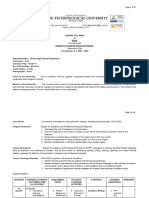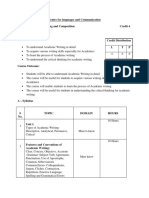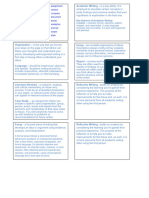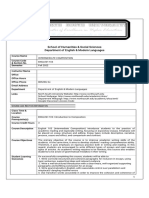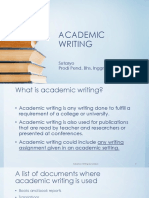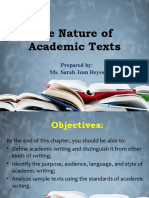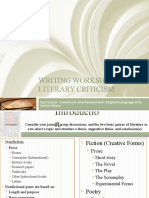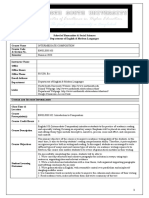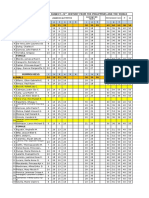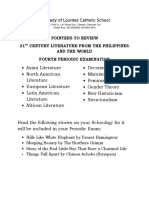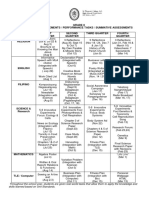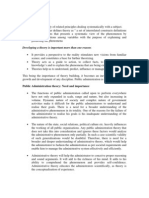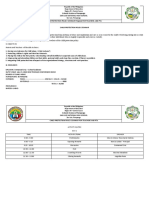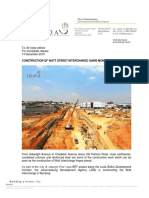Handouts - Eapp 1
Handouts - Eapp 1
Uploaded by
Christenz Anjonel M. CristobalCopyright:
Available Formats
Handouts - Eapp 1
Handouts - Eapp 1
Uploaded by
Christenz Anjonel M. CristobalOriginal Title
Copyright
Available Formats
Share this document
Did you find this document useful?
Is this content inappropriate?
Copyright:
Available Formats
Handouts - Eapp 1
Handouts - Eapp 1
Uploaded by
Christenz Anjonel M. CristobalCopyright:
Available Formats
UNIT 1: A GLIMPSE AT THE WORLD OF WRITING
What is Academic Writing?
Academic writing is a process that starts with posing a question, problematizing a concept, evaluating an
opinion, and ends in answering the question or questions posed, clarifying the problem, and/or arguing for a
stand.
Academic Writing is the process of presenting ideas in a rational, organized, systematic, reasonable and logical
way.
Ideas
Process
Reasonable Rational Logical way Organized Systematic
Academic Writing has a specific purpose:
• To inform
• To argue
• To persuade
The audience is your teacher; audience is composed of people who are knowledgeable on the subject that you
are writing.
A list of documents where academic writing is used
• Book reviews
• Essays
• Research report
• Research proposal
• Scientific paper
• Academic journal
• Dissertation and Thesis
• Abstract
Types of Academic Writing
1) Descriptive: it tells how something looks, feels, smells, tastes, and/or sounds.
2) Narration: to give an account or tell the story of something, someone, or an event. Use time order to organize
sentences.
3) Argumentative or Persuasive: to induce readers to believe in writer’s opinions or views through appealing
reasons. To convince readers.
English for Academic Purposes – Unit 1: Lesson 1Page 1
camc08
Narration
Persuasive or
Descriptive Argumentatio
n
Types of
Academic
Writing
Characteristics of Academic Writing
Planning – There is a certain amount of planning before you start writing the paper - analytical and organized.
Outline – A proper outline is a must for academic writing, helps you formulate your thoughts, make you aware
of certain relationships between topics. It will help you determine the pertinent information to be included in
your paper.
Tone – A formal tone is used. You do not use slang words, slang, jargon, abbreviations, or many clichés.
Language – The language in your paper needs to be clear and words need to be chosen for their precision.
Point-of-view – The point of view in the third person, as the focus of academic writing is to educate on the facts,
not support an opinion.
Approach – Deductive reasoning is a big part of academic writing as your readers have to follow the path that
brought you to your conclusion.
Planning
Approach Outline
Characteristics of
Academic Writing
Point of
Language
view
Formal
tone
English for Academic Purposes – Unit 1: Lesson 1Page 2
camc08
You might also like
- Crossculture Programme: Motivation LetterDocument4 pagesCrossculture Programme: Motivation Letterafif bukhori0% (1)
- FCE-Collins-Test 3 Q1-36 OnlyDocument8 pagesFCE-Collins-Test 3 Q1-36 OnlyemmaNo ratings yet
- History Timeline of Special Education in The United StatesDocument4 pagesHistory Timeline of Special Education in The United Statesapi-241268840No ratings yet
- Mathematics 5 - Quarter 1 - Module 1 - Week 3Document3 pagesMathematics 5 - Quarter 1 - Module 1 - Week 3Luvie Jhun Gahi100% (3)
- ENG3A - G7 - COURSE SYLLABUS FOR EAPP Final VersionDocument10 pagesENG3A - G7 - COURSE SYLLABUS FOR EAPP Final VersionpreglodianeNo ratings yet
- ENG103 Course Outline For Fall 2021-2Document8 pagesENG103 Course Outline For Fall 2021-2Sadman Yeasar Alam 2121352611No ratings yet
- Centre For Languages and Communication Paper 2: Academic Writing and Composition Credit 4Document3 pagesCentre For Languages and Communication Paper 2: Academic Writing and Composition Credit 4khannaharishNo ratings yet
- Academic WritingDocument10 pagesAcademic WritingTaimee AhmedNo ratings yet
- Northwestern University: Basic Education DepartmentDocument4 pagesNorthwestern University: Basic Education DepartmentZsazsaNo ratings yet
- Key Features of Academic Writing Content - Complex, Formal, Objective, ExplicitDocument1 pageKey Features of Academic Writing Content - Complex, Formal, Objective, Explicitverdaderogemma05No ratings yet
- ENG103 Course OutlineDocument6 pagesENG103 Course OutlineFAYAZ AHMEDNo ratings yet
- Detailed Lesson Plan (DLP) Format: Instructional PlanningDocument3 pagesDetailed Lesson Plan (DLP) Format: Instructional PlanningShannen GonzalesNo ratings yet
- English For Academic and Professional PurposesDocument12 pagesEnglish For Academic and Professional Purposesjaycel caprechoNo ratings yet
- Week 1 - Reading Academic TextsDocument11 pagesWeek 1 - Reading Academic TextsGelli GarciaNo ratings yet
- Eapp Assignment 2Document3 pagesEapp Assignment 2Ganilyn PoncianoNo ratings yet
- Academic Writing: by Dian A.N. Nurmala DewiDocument10 pagesAcademic Writing: by Dian A.N. Nurmala DewiRoberto Velasco MabulacNo ratings yet
- NCKH&KNVHT C5Document55 pagesNCKH&KNVHT C5thuhuong1203.h25No ratings yet
- Academic Writing Lala01Document10 pagesAcademic Writing Lala01Kayla AlviniaNo ratings yet
- Lesson 1 Nature of Academic TextsDocument36 pagesLesson 1 Nature of Academic Textsbreismatthew1No ratings yet
- Laidino Carlitos. Study Skill I TaskDocument14 pagesLaidino Carlitos. Study Skill I TaskLaidino Carlitos FernandoNo ratings yet
- Eapp ReviewerDocument4 pagesEapp ReviewerJoshua LacsinaNo ratings yet
- Skills For Study 1 TBDocument118 pagesSkills For Study 1 TBFrancesca Sweeney-AndroulakiNo ratings yet
- Topic-1-Students EappDocument33 pagesTopic-1-Students EappMaridel月No ratings yet
- Module 1 - Reading Academic TextsDocument13 pagesModule 1 - Reading Academic Textssfpdlgaming09No ratings yet
- Academic WritingDocument24 pagesAcademic WritingWidyaNo ratings yet
- Lesson 1: The Nature of Academic TextsDocument13 pagesLesson 1: The Nature of Academic Textsmillanarashleynicole04No ratings yet
- Teaching and Assessing Writing Prsntdby Oraiz Presillas Pulido Ranin and RamosDocument60 pagesTeaching and Assessing Writing Prsntdby Oraiz Presillas Pulido Ranin and RamosShryl Mae Diva100% (1)
- The Nature of Academic TextsDocument23 pagesThe Nature of Academic TextsSarah Jean MaturanNo ratings yet
- Module C Introductory BookletDocument32 pagesModule C Introductory Bookletspareacc1665No ratings yet
- Eapp LessonsDocument6 pagesEapp LessonsAngel Natty NewNo ratings yet
- PBI1102AE1 - ModuleLU4 PartA UpdatedDocument21 pagesPBI1102AE1 - ModuleLU4 PartA UpdatedJeffery UbamNo ratings yet
- Answer Key Grade 7Document13 pagesAnswer Key Grade 7Meynard Garcia CastroNo ratings yet
- Eapp Lesson 1Document32 pagesEapp Lesson 1Joyce OrtegaNo ratings yet
- Academic Writing PresentationDocument8 pagesAcademic Writing PresentationJhong Floreta Montefalcon100% (1)
- Academic WritingDocument53 pagesAcademic WritingTeresa V. ArceoNo ratings yet
- Detailed Lesson Plan (DLP) Format: Instructional PlanningDocument3 pagesDetailed Lesson Plan (DLP) Format: Instructional PlanningShannen GonzalesNo ratings yet
- Writing Workshop Literary Criticism: Curriculum Constructs and Assessment: English/Language ArtsDocument13 pagesWriting Workshop Literary Criticism: Curriculum Constructs and Assessment: English/Language ArtsCynthia GallagherNo ratings yet
- Year 12 2025 English STANDARD Task 1 ISSUEDDocument4 pagesYear 12 2025 English STANDARD Task 1 ISSUEDkresantNo ratings yet
- EAPP Module 1 Week 1 - L. ArenilloDocument9 pagesEAPP Module 1 Week 1 - L. ArenilloLeigh Afable100% (1)
- Week Specific Objectives Content Teaching/Learning Strategies AssessmentDocument4 pagesWeek Specific Objectives Content Teaching/Learning Strategies AssessmentaerisgalangNo ratings yet
- ENG103 Course Outline For Summer 2023Document6 pagesENG103 Course Outline For Summer 2023Asad HasanNo ratings yet
- ENG103 Course Outlinefor Fall 2022Document6 pagesENG103 Course Outlinefor Fall 2022Shagufta ChowdhuryNo ratings yet
- Q1M1Document15 pagesQ1M1Rhain RoxasNo ratings yet
- Lesson 1 Academic TextDocument38 pagesLesson 1 Academic Textxie5386No ratings yet
- Scheme of WorkDocument3 pagesScheme of WorkAlfary SalazarNo ratings yet
- ENG103.37 (NNR) Course Outline.Document5 pagesENG103.37 (NNR) Course Outline.Safikul Islam SakibNo ratings yet
- Nature of Academic TextsDocument14 pagesNature of Academic TextsJulius Cesar Cudera100% (1)
- Academic Writing OutlineDocument40 pagesAcademic Writing Outlinecol akhtarNo ratings yet
- Teaching Grammar: Mission Impossible?: Marion Engrand-O'HaraDocument24 pagesTeaching Grammar: Mission Impossible?: Marion Engrand-O'HaraMordred KnightofthenewdawnNo ratings yet
- Week 1 ACADEMIC TEXT LectureDocument26 pagesWeek 1 ACADEMIC TEXT Lectureyukilour07No ratings yet
- Module 1 Week 1 Eapp PDFDocument11 pagesModule 1 Week 1 Eapp PDFMichael Mamaril100% (4)
- 2nd LecDocument28 pages2nd LecImane DahhaneNo ratings yet
- Lesson 1 EAPPDocument11 pagesLesson 1 EAPPmark daniel beatoNo ratings yet
- Q3 EappDocument6 pagesQ3 EappkathreenezyanaNo ratings yet
- EAPP Q-1 HandoutsDocument14 pagesEAPP Q-1 HandoutsMerry Jessica RusellNo ratings yet
- Principles of WritingDocument20 pagesPrinciples of WritingNoor AynaNo ratings yet
- Eapp Lesson 1 Sy 2023 - 2024Document21 pagesEapp Lesson 1 Sy 2023 - 2024Lea Jenyka LachicaNo ratings yet
- ENGL 157: Communication Skills (I) : Lecture 1:introduction and Overview of The CourseDocument12 pagesENGL 157: Communication Skills (I) : Lecture 1:introduction and Overview of The Coursenana kwameNo ratings yet
- ENG103 Course Outline For Intersession 2023-1 - 502424943Document5 pagesENG103 Course Outline For Intersession 2023-1 - 502424943Mithen hokNo ratings yet
- Eapp PPT Academic WritingDocument23 pagesEapp PPT Academic WritingAssej AidialNo ratings yet
- Capstone Project Assessment CriteriaDocument2 pagesCapstone Project Assessment CriteriaHuy TrươngNo ratings yet
- Academic Writing - School and College Students: Learn Academic Writing EasilyFrom EverandAcademic Writing - School and College Students: Learn Academic Writing EasilyNo ratings yet
- BA115 Week 6Document21 pagesBA115 Week 6cathrinendl123No ratings yet
- ME Eng 7 Q4 1901 - SG - Features of Academic WritingDocument8 pagesME Eng 7 Q4 1901 - SG - Features of Academic WritingEliza Mae LasanNo ratings yet
- Diwa Pasiklaban Sa Paaralan Level Name Rank PointDocument4 pagesDiwa Pasiklaban Sa Paaralan Level Name Rank PointChristenz Anjonel M. CristobalNo ratings yet
- Our Lady of Lourdes Catholic SchoolDocument2 pagesOur Lady of Lourdes Catholic SchoolChristenz Anjonel M. CristobalNo ratings yet
- Our Lady of Lourdes Catholic SchoolDocument2 pagesOur Lady of Lourdes Catholic SchoolChristenz Anjonel M. CristobalNo ratings yet
- Our Lady of Lourdes Catholic School: St. Paul STS., La Forteza Subd., Camarin Caloocan CityDocument4 pagesOur Lady of Lourdes Catholic School: St. Paul STS., La Forteza Subd., Camarin Caloocan CityChristenz Anjonel M. CristobalNo ratings yet
- Grade 11 (English For Academic and Professional Purposes) FLDDocument1 pageGrade 11 (English For Academic and Professional Purposes) FLDChristenz Anjonel M. CristobalNo ratings yet
- May Kulang (2nd Quarter)Document5 pagesMay Kulang (2nd Quarter)Christenz Anjonel M. CristobalNo ratings yet
- POINTERS TO REVIEW JHS (1st Quarter)Document2 pagesPOINTERS TO REVIEW JHS (1st Quarter)Christenz Anjonel M. CristobalNo ratings yet
- Quarter: Fourth Subject: 21 Century From The Philippines and The WorldDocument3 pagesQuarter: Fourth Subject: 21 Century From The Philippines and The WorldChristenz Anjonel M. CristobalNo ratings yet
- ANSWER KEY (2nd Quarter) ST #1Document2 pagesANSWER KEY (2nd Quarter) ST #1Christenz Anjonel M. CristobalNo ratings yet
- Science Fiction or SciDocument4 pagesScience Fiction or SciChristenz Anjonel M. CristobalNo ratings yet
- Date Activit y Topic/Cover Age: English For Academic and Professional Purposes 11Document2 pagesDate Activit y Topic/Cover Age: English For Academic and Professional Purposes 11Christenz Anjonel M. CristobalNo ratings yet
- 21st Century - Pointers To Review - 4th QuarterDocument1 page21st Century - Pointers To Review - 4th QuarterChristenz Anjonel M. CristobalNo ratings yet
- Skills Learned Based On Unit Standards.: St. Theresa's College, Q.C. High School Department SY 2016 - 2017Document1 pageSkills Learned Based On Unit Standards.: St. Theresa's College, Q.C. High School Department SY 2016 - 2017Christenz Anjonel M. CristobalNo ratings yet
- Lesson One Half A Day: Period 1-2Document72 pagesLesson One Half A Day: Period 1-2Christenz Anjonel M. CristobalNo ratings yet
- Guidelines For The SHS Level Meeting PDFDocument2 pagesGuidelines For The SHS Level Meeting PDFChristenz Anjonel M. CristobalNo ratings yet
- 12 National Youth Parliament Guidebook Davao CityDocument24 pages12 National Youth Parliament Guidebook Davao CityTheGood GuyNo ratings yet
- Format. Hum - Mid Day Meal - MDM - Programme in West Bengal A StudyDocument12 pagesFormat. Hum - Mid Day Meal - MDM - Programme in West Bengal A StudyImpact JournalsNo ratings yet
- Wright County Attorney, Karen Wolff 10 2 Street NW, Buffalo MN 55313 Fax 763-682-7700Document17 pagesWright County Attorney, Karen Wolff 10 2 Street NW, Buffalo MN 55313 Fax 763-682-7700Don MashakNo ratings yet
- Reading Film and Literature: Brian Mcfarlane, 2007Document11 pagesReading Film and Literature: Brian Mcfarlane, 2007sheela sinhaNo ratings yet
- Addendum - Eric AngDocument2 pagesAddendum - Eric Angsean contrerasNo ratings yet
- Customer Satisfaction Index-Things You Need To KnowDocument8 pagesCustomer Satisfaction Index-Things You Need To KnowdhjuNo ratings yet
- Basic Practice Unit 3 Test: Vocabulary 20 Points Grammar 20 PointsDocument1 pageBasic Practice Unit 3 Test: Vocabulary 20 Points Grammar 20 PointsFer PineiroNo ratings yet
- Introduction To The Hospitality Industry: From Ancient To Modern TimeDocument34 pagesIntroduction To The Hospitality Industry: From Ancient To Modern TimePrayrana AryaNo ratings yet
- The Petroleum Value Chain-GhanaDocument20 pagesThe Petroleum Value Chain-GhanaMichael AryeeteyNo ratings yet
- Office of The Under Secretary of Defense (Comptroller) /chief Financial Officer MAY 2021Document24 pagesOffice of The Under Secretary of Defense (Comptroller) /chief Financial Officer MAY 2021luqiya123456No ratings yet
- The Use of Tiktok Videos in Enhancing The Speaking and Grammar Skills of Criminology StudentsDocument10 pagesThe Use of Tiktok Videos in Enhancing The Speaking and Grammar Skills of Criminology StudentsKatherine Dahang100% (1)
- Teerthanker Mahaveer College of Nursing: SubjectDocument9 pagesTeerthanker Mahaveer College of Nursing: SubjectPrasann RoyNo ratings yet
- Dzexams 1as Anglais t1 20160 347603Document2 pagesDzexams 1as Anglais t1 20160 347603Nouh Nahnouh100% (2)
- Project Report On AdvertisingDocument67 pagesProject Report On AdvertisingKetan RathodNo ratings yet
- Overcrowding in ClassroomsDocument16 pagesOvercrowding in Classroomsapi-488983896No ratings yet
- Starkville Dispatch Eedition 2-10-19Document28 pagesStarkville Dispatch Eedition 2-10-19The DispatchNo ratings yet
- Department of Education: Batangas City South Senior High SchoolDocument5 pagesDepartment of Education: Batangas City South Senior High Schoolmarinella borbonNo ratings yet
- Villas - Merlie Alunan The Filipino Writer As Bisaya - With CorrectionsDocument12 pagesVillas - Merlie Alunan The Filipino Writer As Bisaya - With CorrectionsMichael Carlo VillasNo ratings yet
- CET REVIEWER - ALL (Answers)Document6 pagesCET REVIEWER - ALL (Answers)margaNo ratings yet
- Administrative Theory - RelevanceDocument1 pageAdministrative Theory - Relevancesunishsugunan100% (1)
- Zainal Fikri 424366380Document2 pagesZainal Fikri 424366380Green Sustain EnergyNo ratings yet
- Ankita Rudra: Current WorkDocument3 pagesAnkita Rudra: Current WorkHRD CORP CONSULTANCYNo ratings yet
- จัดตารางสอบกลางภาคภาคต้น53Document332 pagesจัดตารางสอบกลางภาคภาคต้น53Yuwarath SuktrakoonNo ratings yet
- San Luis National High School: I. RationaleDocument10 pagesSan Luis National High School: I. RationaleArianne SagumNo ratings yet
- Construction of Watt Street Interchange Gains Momentum v3Document3 pagesConstruction of Watt Street Interchange Gains Momentum v3NIOH0% (1)
- Generosity SpectrumDocument16 pagesGenerosity SpectrumpadmaNo ratings yet




